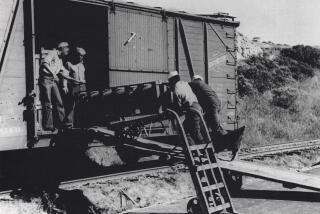My Father Paid a High Penalty for Standing Up For His Race
- Share via
As I was growing up, when I asked my father, “What did you do in the war, Daddy?” his reply was a hesitant and subdued, “I was in the Navy.” Our mother quickly moved me on to another subject. Little did I know at the time the embarrassment and shame our parents were experiencing by having to conceal the truth from me and their other children. I only recently learned what really happened, and what a hero my father was for standing up for what he thought was right and for being the kind of loving parent and husband he has been since that time. I want his story told.
My father, Freddie Meeks, is a convicted mutineer. I believe--as do many others, including Rep. George Miller (D-Martinez)--that he and other sailors involved in the same incident were wrongly accused. Yet, despite numerous efforts to clear their records, nothing has been done. Tonight, at least their story will be told on NBC-TV’s “Mutiny.”
My father joined the Navy on Aug. 25, 1943, because he wanted to help the war effort. Like the vast majority of African American servicemen at that time, he was segregated into a support unit rather than being allowed to work on ships. He was assigned as a stevedore loading munitions at Port Chicago Naval Magazine near San Francisco.
On July 17, 1944, two U.S. Navy ammunition ships and the entire Port Chicago waterfront were destroyed in an explosion that rated 3.4 on the Richter scale. The cataclysm killed 320 sailors--202 of whom were black stevedores.
As was made clear later, the men loading munitions had no training for that. Also, the black crews were under heavy pressure from white officers to load as fast as possible, and crews that didn’t go fast enough found their liberty reduced.
The black sailors who survived the explosion--luckily, my father was on liberty in the city at the time--picked the mangled bodies of their comrades from the debris. Although white sailors were sent home on leave in the aftermath, black sailors were ordered to return to the port within 24 days to the same work under what they believed continued to be extremely dangerous conditions. These black sailors refused to go without the training that was needed to perform such a critical job. As my father told Richard Paddock of the Los Angeles Times in 1994, “We decided we would not go back and load the ships under those conditions.”
All told, 258 sailors were court-martialed for their action. Of those, 208 received lighter sentences for not obeying orders. Fifty of them, including my dad, were convicted of mutiny and sentenced to up to 15 years of hard labor.
In 1946, Thurgood Marshall, then general counsel to the NAACP and later a U.S. Supreme Court justice, was able to get the men’s sentences reduced to 16 months. But these men, many dead now, lived under the cloud of dishonorable discharges all their lives.
Miller and many other California politicians strongly support efforts to clear the records of the black servicemen accused of mutiny. Last week, Miller announced that a major law firm had initiated a formal pardon appeal process on behalf of my father. In making the announcement, Miller said, “Every aspect of the operations at Port Chicago that sent untrained black sailors into the extremely dangerous business of munition loading was tinged by race, and so was the decision to prosecute those who refused to allow the segregated system to continue.”
My father, who is now 79 and is retired both from Los Angeles County, where he was supervisor of the county warehouse, and from Los Angeles city, where he was a security officer, still suffers from humiliation because of his military record. Even as recently as a few years ago, he hesitated to reveal the true story to me out of fear that it would affect my ambition to become a sheriff’s deputy. Now I want the world to know how proud I am of my father.
None of my father’s children has ever seen him as anything less than a hero. He was our hero because he was home when we needed him. He was our hero because he diligently provided for our family during a period of tremendous racial discrimination. He was our hero because, through his actions, the meaning of family was defined for us. He was our hero because of the love he had for us and for our mother, to whom he has been married for 59 years. And he was our hero because he was our best friend.
My father taught me the importance of duty, honor and responsibility, which he and the other 49 Port Chicago protesters also boldly displayed. I am honored to say he is my father.
More to Read
Sign up for Essential California
The most important California stories and recommendations in your inbox every morning.
You may occasionally receive promotional content from the Los Angeles Times.













